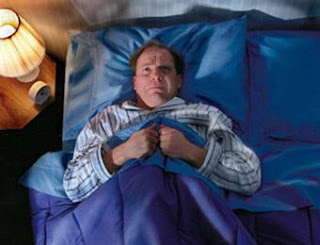Insomnia Help Video – Sleep Cycle.
Our sleep is regulated by an internal body clock (circadian clock). When we fall asleep, our sleep circles in cycles throughout the night, moving between deep restorative sleep, more alert stages and dreaming. As the night passes, we spend more time in dream sleep and lighter sleep.
There are two main types of sleep. REM (Rapid Eye Movement) sleep is when you do most active dreaming. Your eyes actually move back and forth during this stage, which is why it is called REM sleep. Non-REM (NREM) sleep consists of four stages of deeper and deeper sleep. Each sleep stage is important for quality sleep, but deep sleep and REM sleep are especially vital.
Stage 1 (Drowsiness) – Lasts just five or ten minutes. Eyes move slowly under the eyelids, muscle activity slows down, and we are easily awakened.
Stage 2 (Light Sleep) - Eye movements stop, heart rate slows, and body temperature decreases.
Stages 3 and 4 (Deep Sleep) – We are difficult to wake up, and if awakened, do not adjust immediately and often feel groggy and disoriented for several minutes. Blood flow decreases to the brain in this stage, and redirects itself towards the muscles, restoring physical energy. Research also shows that immune functions increase during deep sleep.
REM sleep (Dream Sleep) –We usually have three to five REM episodes per night. This stage is associated with processing emotions, retaining memories and relieving stress. Breathing is rapid, irregular and shallow, the heart rate increases.
Sleep Cycle and Coffee
You might be surprised that caffeine can cause sleep problems up to ten to twelve hours after drinking it! There is new evidence that coffee can really interfere in your attempts to get good sleep when you need it most. According to a recent study led by a Canadian researcher in Montreal, caffeine intervenes with sleep and this effect increases with age. This is probably anything too shocking and new. We all know caffeine is a stimulant that can disrupt sleep and cause insomnia when taken too close to bedtime. But this study pointed out the fact that caffeine can have hidden threat.
Many people who enjoy coffee affirm that they can sleep like a baby after drinking coffee before bedtime, and that it does not affect them as significantly as others. That is not completely true. If you put them into sleep labs, you will find that their sleep fragmented. They do not get quality sleep even though they think they do. While it is true that everyone's tolerance and metabolism for caffeine may be slightly different, that does not mean some of us get a free pass on its negative lack of REM sleep.
Sleep Cycle and Alcohol
Many people think that a drink or two before bed will help them sleep. While it may help you fall asleep faster, alcohol reduces the sleep quality, waking you up later in the night. Many people usually associate alcohol with sleep and sleepiness. However, the effects of alcohol on sleep are mostly negative. A recent study revealed that 13% had used alcohol specifically as a sleep aid. The effects for those who drink themselves to sleep are exactly what they are trying to avoid.
Alcohol causes the lack of REM sleep and metabolism that clears it from your body causes a withdrawal syndrome. This withdrawal causes awakenings and is often associated with nightmares and sweats. Night drinkers have more difficulty getting up in the morning, particularly because of hangover. But what happens when you try to fall asleep the next night? You will have trouble doing so without having another drink, thus starting a vicious cycle. Over time, the body becomes dependent upon alcohol in order to fall asleep.
Subscribe to:
Post Comments (Atom)













1 comments:
You have a wonderful post on the importance of sleep. The one thing that really throws people off, is when they talk about sleep and alcohol. I am happy that you have extinguished that myth. I would greatly appreciate it if you stopped by my health blog. The site is http://healthy-nutrition-facts.blogspot.com/ Have a wonderful day and stay healthy!
Post a Comment